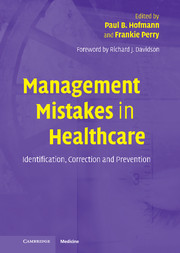Book contents
- Frontmatter
- Contents
- Notes on the contributors
- Foreword
- Preface
- Acknowledgments
- Part I Addressing management mistakes in healthcare
- Part II Case studies of mistakes in healthcare management
- 7 Medical errors: Paradise Hills Medical Center
- 8 Nursing shortage: Metropolitan Community Hospital
- 9 Information technology setback: Heartland Healthcare System
- 10 Inept strategic planning: Southwestern Regional Healthcare System
- 11 Public relations fiasco, George C. Fremont Community Hospital
- 12 Ineffectual governance: Pleasant Valley Regional Health System
- 13 Failed hospital merger: Richland River Valley Healthcare System
- 14 UK review of selected cases
- 15 Lessons learned: insights and admonitions
- Suggested further reading
- Index
- References
15 - Lessons learned: insights and admonitions
Published online by Cambridge University Press: 12 October 2009
- Frontmatter
- Contents
- Notes on the contributors
- Foreword
- Preface
- Acknowledgments
- Part I Addressing management mistakes in healthcare
- Part II Case studies of mistakes in healthcare management
- 7 Medical errors: Paradise Hills Medical Center
- 8 Nursing shortage: Metropolitan Community Hospital
- 9 Information technology setback: Heartland Healthcare System
- 10 Inept strategic planning: Southwestern Regional Healthcare System
- 11 Public relations fiasco, George C. Fremont Community Hospital
- 12 Ineffectual governance: Pleasant Valley Regional Health System
- 13 Failed hospital merger: Richland River Valley Healthcare System
- 14 UK review of selected cases
- 15 Lessons learned: insights and admonitions
- Suggested further reading
- Index
- References
Summary
The influence of ego and personal values on organizational culture
As emphasized in our preface and chapter 1, acknowledging and examining mistakes in healthcare management is not a common activity. Nonetheless, it is indisputable that significant mistakes have occurred, and some errors are inevitable. Unfortunately, while clinical errors occur with greater frequency than we are comfortable in admitting, the number and magnitude of management mistakes is even less well acknowledged. The aggregate economic and non-economic costs are incalculable. Moreover, because these mistakes occur in hospitals and other healthcare settings, patients, families, and communities are adversely affected, not just employees, physicians, executives, and board members. US Representative Pete Stark has said that healthcare executives should be held to a higher standard of ethics and compliance than their counterparts at non-healthcare companies, “because mistakes and a cavalier attitude can cause serious harm or even death. At least nobody died at Enron. We're seeing a culture of apathy in health care that's too bad” (Taylor 2003).
Some executives have large egos, and many do not invite – or, in certain cases, even permit – constructive criticism of their decisions. Conventional wisdom suggests that the more senior the executive, the less likely that person will be informed of mistakes. Regrettably, management hubris can contribute to professional hypocrisy. Executives find ways to excuse or defend their mistakes when they would never condone such behavior by others.
- Type
- Chapter
- Information
- Management Mistakes in HealthcareIdentification, Correction, and Prevention, pp. 225 - 239Publisher: Cambridge University PressPrint publication year: 2004



